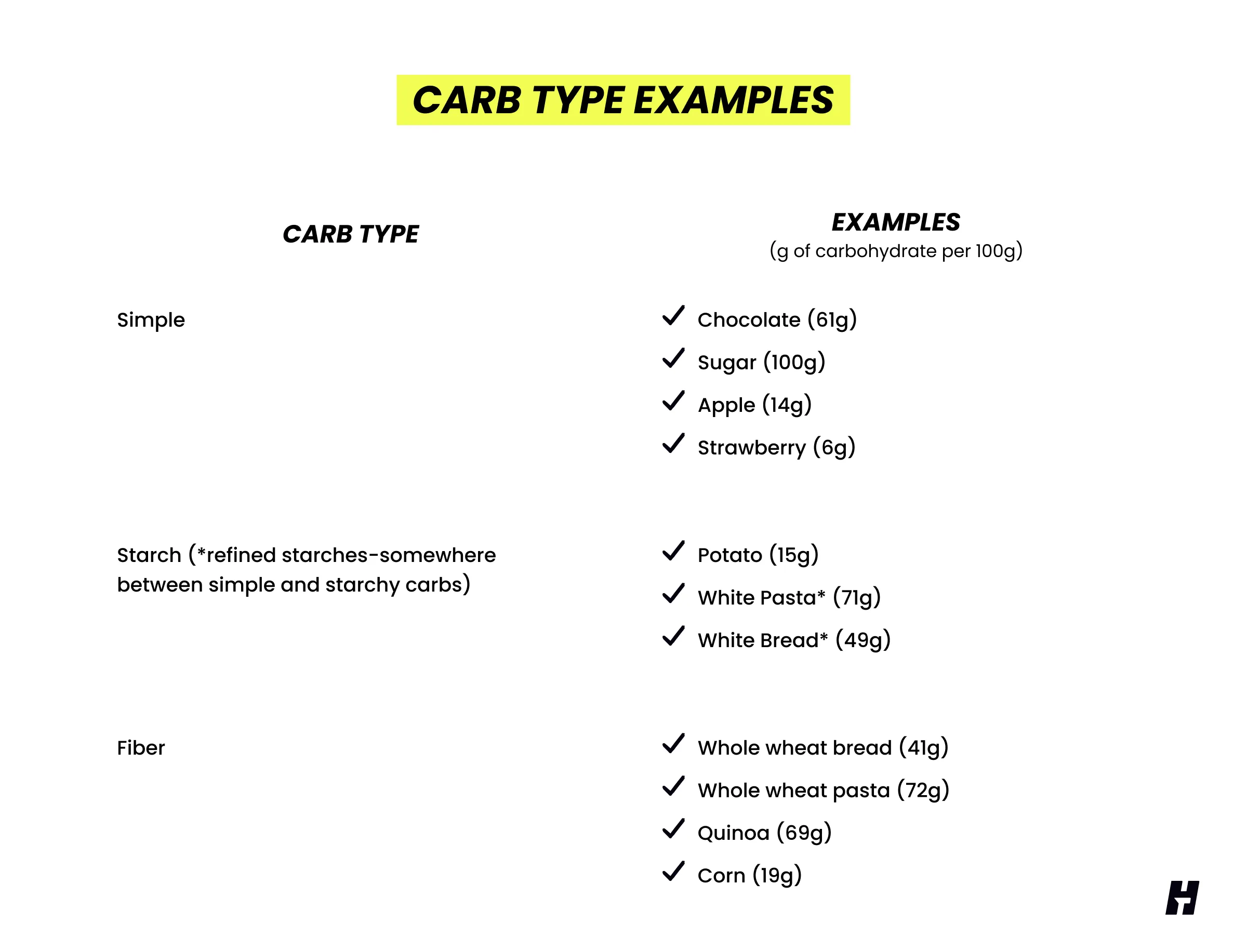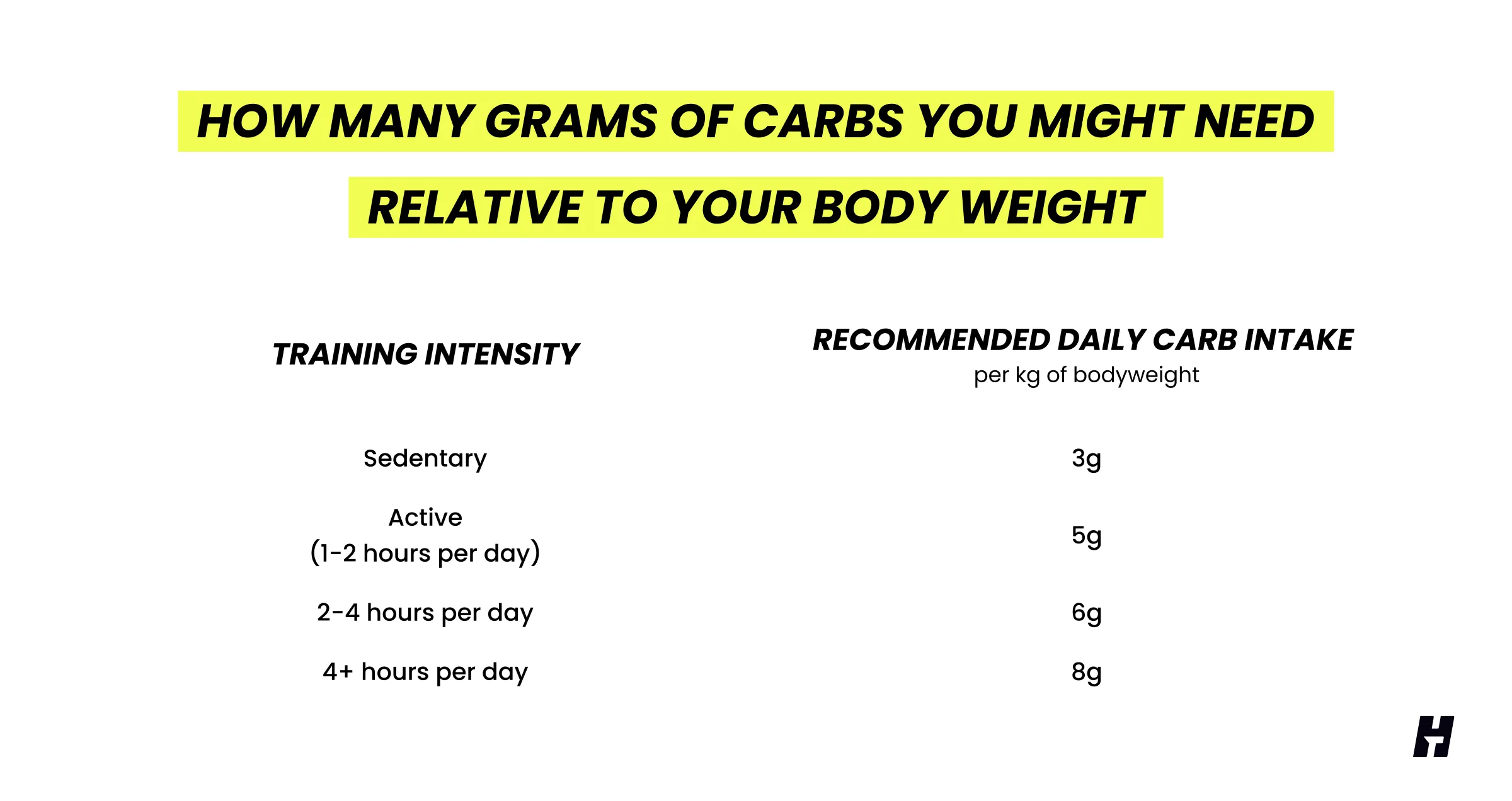Functional Athletes Need Carbohydrates
TOPIC: Nutrition
The world of carbohydrates can be a difficult one to manage. They can leave you in a sweet spot of proper fuelling and recovery as an athlete, or crashing and burning when it matters most. This simple guide will hopefully give you a better idea of how best to incorporate carbs properly into your nutrition plan.

Written By
fred ormerod
Fred Ormerod is a freelance coach, army reserve medic, nurse, master’s student, and massage therapist. He’s spent a decade working in healthcare and five years coaching in one of Edinburgh’s leading training facilities.
Website
Programs
What Do Carbs Actually Do?
Carbohydrates (carbs) are our main source of energy for creating adenosine triphosphate (ATP), which our muscles run on. Made up of carbon, hydrogen and oxygen, carbs are the fuel in the combustion engine (respiration) that drives us as athletes. Each gram of carbohydrate contains 4 calories. Carbs should make up about 55-60% of a person’s daily calorie intake, but this varies depending on a number of factors, including how active you are.
Carbs can be simple or complex (just like any good relationship) and each form has its uses.
Simple carbs are basic sugars. Complex carbs are chains of sugars strung together. Fiber is a form of complex carb that our body doesn’t digest, but instead acts as roughage in the digestive system.
It’s worth noting that all carbohydrates are broken down into sugars during digestion and the rate of digestion is affected by everything else we eat (not just carbs). Your requirement for energy changes throughout the day and varies a bit by training sessions. Keep in mind that complex carbs, digested slower, might not provide sufficient fuel source for some activities, though in some circles they’re considered “healthier” options.
There is some debate about sugar consumption and insulin secretion, and it’s fair to say that consuming too much sugar over long periods of time can have negative effects when improperly maintained (diabetes, hyperglycemia, mood swings, energy dips etc.).
Loading up on too much sugar immediately before exercise can cause a sudden rise in insulin levels which, combined with the body’s need to utilize sugars during exercise, can lead to hypoglycemia (low blood sugars) and your energy crashing after an intense session. Realistically, so long as your calories are balanced and you’re not binging huge amounts of sugars before and after training, you should be fine.

Carbohydrate Requirements for Athletes
So what, as an athlete, does my body actually need? It’s worth asking yourself a few questions at this point…
- Do you take part in a sport that is predominantly in an aerobic or anaerobic training zone?
- Does your current training block require greater aerobic zone training?
- Do you have body composition considerations to make? Do you want to lose weight, gain weight, etc?
Athletes who train for greater lengths of time in an aerobic zone (roughly 60-75% max heart rate) require large amounts of carbohydrate for fueling training (soccer players, runners etc.). However, given the different properties of carbs, some athletes can benefit from changes in body composition that might be manipulated by changing carb consumption, particularly fiber and sugars.
What About Keto?
Controversially (if you’re a keto warrior), a functional athlete’s requirements for carbohydrates are not really different to anyone else’s. Carbohydrate requirements are largely dictated by time and intensity of an athlete’s training sessions and training week. The more intense or longer the sessions, the more carbs you need to function optimally.
Those who feel like they benefit from a low carb diet, in my experience, are simply benefitting from shorter-lived boosts in energy and performance related to weight loss. They might also feel some benefit because any carbs they do eat are more quickly absorbed due to a lack of sugar in the bloodstream.
Really the best (and most delicious) way to find out what suits you is to experiment. If you’re training hard and regularly and are suffering from being tired, poor performance and chronic delayed onset muscular soreness (DOMS) then increasing your carbs is a good place to start.
Here’s a rough guide of how many grams of carbs you might need relative to your body weight.

Eating Carbs Around Exercise
Eating carbohydrates around exercising is crucial as they serve as the body’s primary energy source, replenish glycogen stores, regulate blood sugar, and enhance endurance.
Before You Train
Athletes are recommended to consume 200-300g of carbs 3-4 hours before training. This can work in fluid form 90 minutes to 2 hours before if you train early in the morning, preferably with some salts. Otherwise compromises will just have to be made. 60-80g of sugars in one liter of water (6% solution is commonly available in the shops) 1 hour before training has also been shown to help performance.
During Workouts
Isotonic drinks are a useful way of consuming carbs during exercise, particularly because they appear to reduce the amount of liquid required to replenish water lost through sweat and urination. >600ml of fluid containing 60g of carbs per hour of exercise is recommended.
It’s worth trying this in training before you go downing loads of drinks during a competition, in case your body doesn’t immediately tolerate this hydration/fuelling protocol.
Post Exercise
Around 1g per kilo of body weight of carbs is a good start immediately post exercise. This will help with recovery, DOMS and glycogen replenishment (this is helped further by adding in 30g of protein post workout).
Some would even suggest repeating this protocol 2 hours after exercise where appropriate (i.e. if you’re not training again), during which time you might eat meals as normal.
By now, if you’ve been doing the math on how much carbohydrate you’ll have consumed just around training, you might be feeling very full. It’s definitely worth keeping an eye on these numbers to make sure they still fall within your macronutrient targets, tailoring meals outside training to suit whatever is left. In an attempt to quickly summarize what can be an over complicated subject, it’s best to start big and work small in many ways.
In order of priority:
- Build your main meals around larger more complex carbohydrate sources, this should include 7-10 portions (roughly 80g) of fruit and vegetables.
- Aim to eat sufficient carbohydrate on a daily basis, relative to your body weight, training goals and requirement (see table).
- Use sugars and isotonic drinks to supplement carb intake before, during and after exercise.
Find Your Perfect Training Plan
Sometimes all you need to reach your destination on your fitness journey is an expert guide. Look no further, we've got you covered. Browse from thousands of programs for any goal and every type of athlete.
Try any programming subscription FREE for 7 days!
Related Articles
You May Also Like...
Intermittent Fasting for Shift-Working Athletes
Shift work can make fueling for performance feel like a constant battle. Between erratic schedules, disrupted sleep, and unpredictable training windows, sticking to a nutrition plan can be tough. Intermittent fasting (IF) offers a flexible approach that may already...
Sustainable Steps to Healthier Living After Significant Weight Gain (BMI 40+)
Losing weight when your BMI is 40 or higher can feel impossible—but it’s not. I've helped hundreds of people, including myself, lose significant weight. One client sticks with me—a former rugby player and sumo wrestler whose health was rapidly declining. We started...
Working Out During Ramadan: Maintaining & Making Gains
It’s falsely believed by many Muslim athletes that Ramadan = losing progress (gains!). This isn’t the case if you train, fuel, hydrate, and sleep appropriately. Of course that’s easier said than done, but following a few of these strategies can make all the difference...
Intermittent Fasting for Shift-Working Athletes
Shift work can make fueling for performance feel like a constant battle. Between erratic schedules, disrupted sleep, and unpredictable training windows, sticking to a nutrition plan can be tough. Intermittent fasting (IF) offers a flexible approach that may already...
Sustainable Steps to Healthier Living After Significant Weight Gain (BMI 40+)
Losing weight when your BMI is 40 or higher can feel impossible—but it’s not. I've helped hundreds of people, including myself, lose significant weight. One client sticks with me—a former rugby player and sumo wrestler whose health was rapidly declining. We started...

Want more training content?
Subscribe
For Coaches
For Athletes
About
Support
Training Lab
Access the latest articles, reviews, and case studies from the top strength and conditioning minds in the TH Training Lab!
Made with love, sweat, protein isolate and hard work in Denver, CO
© 2024 TrainHeroic, Inc. All rights reserved.





